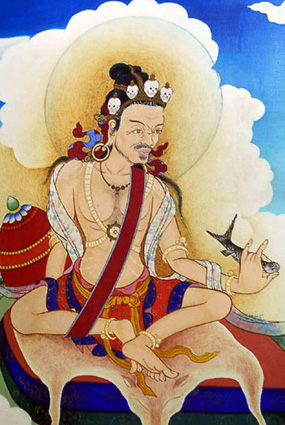
As non-Vajrayana Western converts to Buddhism will tell you, we have a slightly awkward relationship with Tibet. Not that we have any real bone to pick with our Tantric brothers and sisters. It's mostly just a difference of style. Practice models in the three other common convert denominations – Zen, Vipassana, Theravada – are pretty stripped-down, with Zen probably being the most "gorgeous" of the very Puritan lot. Tibetan forms, meanwhile, are downright High Church.
More prosaic is the simple fact that the Dalai Lama is the only Buddhist most Westerners can name, and since our media regularly imply that he's the "boss of Buddhism", we're all generally believed to owe him fealty. Thus, non-Buddhists are often surprised to learn that I don't really follow the guy's news – he's fine as far as august spiritual figures go, but carries no greater weight with me than the Pope or other sincere religious celebrities.
Similarly, Tibetan Buddhist stereotypes often pass for Buddhist, full stop. Yet I rarely chant "om"; I don't own a copy of the Tibetan Book of the Dead; my Zen teaching embraces transmigration (which I don't necessarily buy, either) rather than reincarnation; and therefore we don't believe past masters can inhabit children.
All of which to say, non-Tantric Neo-Buddhists tend to know fairly little about that tradition or its teachings.
So I was grateful when a fellow Mastodonian shared a particularly provocative passage from Tilopa, an Indian sage whose wisdom looms large in Tibet. Upon further exploration I learned that the posted lines are actually the heart statement of the great Tantra master's programme.
The interpretation presented can be traced to Alan Watts, and reads as follows:
No thought, no reflection, no analysis,Certainly a Zen-friendly sentiment, in that we-say-these-things-a-lot-but-never-do-them kind of way. And other translations found elsewhere enrich the context:
No cultivation, no intention;
Let it settle itself.
Don’t recall.A bit more Soto in flavour than Watts' Rinzai-esque lines, perhaps, consisting of nuts and bolts exhortations ("act this way") rather than a self-absent explication of phenomena. But taken together – as is usually the case with these two schools of Japanese Zen – they bring greater insight.
Don’t imagine.
Don’t think.
Don’t examine.
Don’t control.
Rest.
And finally, this fraternal take:
Let go of what has passed.(Both of the non-Watts translations quoted here are the work of Tibetan Buddhism teacher Ken Mcleod.)
Let go of what may come.
Let go of what is happening now.
Don’t try to figure anything out.
Don’t try to make anything happen.
Relax, right now, and rest.
So I'm paying this forward, as a particularly valuable meditation for Zenners, regardless of source.
Because it's not just good stuff, it's Zen stuff. And also good Zen stuff.
(Tableau of Tilopa courtesy of Wikimedia Commons and a generous photographer.)
I say, an interesting post in a freeing way.
ReplyDeleteThanks!
ReplyDelete